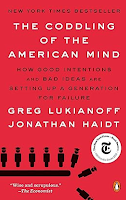I recently read The Coddling of the American Mind: How Good Intentions and Bad Ideas are Setting Up a Generation of Failure, by Greg Lukianoff and Jonathon Haidt (2018).
1) The Untruth of Fragility: What doesn’t kill you makes you weaker;
2) The Untruth of Emotional Reasoning: Always trust your feelings; and
3)The Untruth of Us Versus Them: Life is a battle between good people and evil people.
My top takeaways:
· “Untruths” contradict ancient wisdom, contradict modern psychological research on well-being, and harm individuals and communities.
· There is great wisdom in the old saying: “Prepare the child for the road, not the road for the child.”
· There are two kinds of identity politics: Common-Humanity (unifying approach) and Common-Enemy (divisive approach).
· Words are NOT violence, and telling our children so is not healthy.
· Definition of Witch Hunt: they seem to come out of nowhere; they involve charges of crimes against the collective; the offenses that lead to those charges are often trivial or fabricated; and people who know that the accused is innocent keep quiet, or in extreme cases, they join the mob.
· The loss of Free Play time is exacting a heavy and detrimental price on the socio-emotional development of our children.
· Two common conceptions of justice: 1) Distributive justice (the perception that people are getting what is deserved), and 2) Procedural justice (the perception that the process by which things are distributed and rules are enforced is fair and trustworthy).
· Four rules for productive disagreement: 1) Frame it as a debate, rather than a conflict. 2) Argue as if you’re right, but listen as if you’re wrong (and be willing to change your mind). 3) Make the most respectful interpretation of the other person’s perspective. 4) Acknowledge where you agree with your critics and what you’ve learned from them.
My favorite quotes:
“… wind extinguishes a candle but energizes a fire.” (p.23)
“A culture that allows the concept of “safety” to creep so far that it equates emotional discomfort with physical danger is a culture that encourages people to systematically protect one another from the very experiences embedded in daily life that they need in order to become strong and healthy.” (p.29)
“Mass movements can rise and spread without belief in a God, but never without belief in a devil.” -from Eric Hoffer, in The True Believer (p.99)
“Free play helps children develop the skills of cooperation and dispute resolution that are closely related to the “art of association” upon which democracies depend. When citizens are not skilled in this art, they are less able to work out the ordinary conflicts of daily life. They will more frequently call for authorities to apply coercive force to their opponents. They will be more likely to welcome the bureaucracy of safetyism.” (p.194)
While Lukianoff and Haidt get into the weeds a little prescriptively toward the end of the book, I found the premise of their arguments to be sound and consistent with my societal observations.
This is a book I’m thankful to have read. And, I’m thankful that my grandchildren are being raised by parents and educators who are teaching them that life is what we make of it, not what happens to us.


No comments:
Post a Comment
Note: Only a member of this blog may post a comment.